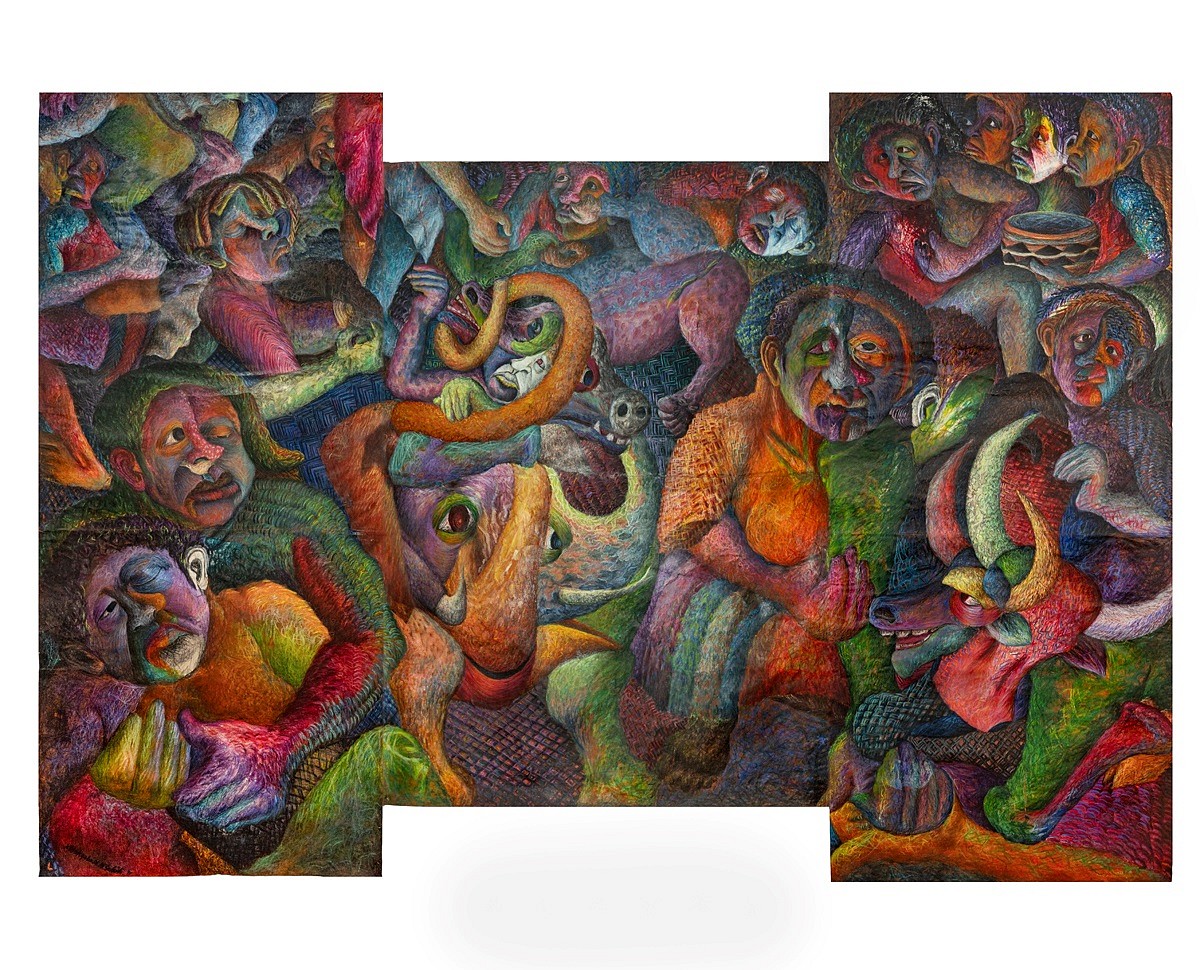PRESS RELEASE

MMAKGABO HELEN SEBIDI: Ntlo E Etsamayang (The Walking House)
Jul 10 – Jul 31, 2024
Everard Read Cape Town is pleased to present Ntlo E Etsamayang (The Walking House), a solo exhibiton of historical works by Mmakgabo Helen Sebidi
Ntlo E Tsamayang (The Walking House) is a triumphant celebration of Mmakgabo Mmapula Helen Sebidi’s remarkable artistic journey and commitment to communication. This is marked by the recovery of 28 lost artworks following more than three decades of agonising grief.
Standing as the bridge between many worlds, Sebidi embodies a turning point in national politics taking place in the '80s and '90s, a time when apartheid could no longer hold. Within this transformative narrative, she emerges as a symbol of resilience and political awakening, capturing the essence of a nation in flux. These artworks not only reclaim lost masterpieces to the public eye but crucially resurrect a critical chapter in the national artistic consciousness. Each communicates an acute and unbounded search into the relationship between humanism and spiritualism of the contemporary Black African lived experience. This exhibition showcases not only Sebidi’s early artistic endeavours but also a pivotal juncture in her practice, heralding a significant moment of stylistic transformation into a new idiom that would pulsate with energy. Part figuration, part abstraction, her work continuously seeks to escape the boundaries of both.
Following a terrible car crash in late 1989, while lying in hospital seriously injured, Sebidi had a vision of a woman wearing a dress adorned with red roses and black leaves. The woman urged Sebidi to leave the hospital immediately, as her work was not yet finished. Despite her significant injuries, Sebidi made her way home. During her recovery, as she struggled to sleep, she worked relentlessly, rendering the series of remarkable, profound, and intensely self-expressive vivid pastel drawings in this exhibition.
In 1991, Sebidi brought all of these drawings, along with her most cherished prints and paintings from her collection, to Sweden. She had been invited to Nykoping, a small town on the Baltic Sea, south of Stockholm, to participate in a program called “Cultural work with developing countries.” Her role in the program was to “work with graphic arts” and “have an exhibition of [her] own” where she would “have many opportunities to meet Swedish artists and establish contact with them”. The project was carried out in collaboration with several cultural institutions, and received financial support from the Swedish Institute.
Throughout her month-long residency, Sebidi shared insights about South Africa’s art, culture, and politics to various Swedish artists at the Nyköping Folk High School, a residential college for adult education in Sweden.
Although the planned exhibition did not take place during Sebidi’s time in Sweden, she was assured that it would happen if she left her art in the care of the organisers. A year passed without any communication, and Sebidi eventually requestedthat her art be sent back home. However, all she received was a box of beadwork, which was to accompany the proposed exhibition. She was informed that her art had been stolen. Distraught, Sebidi made numerous attempts to contact the organisers through written correspondence and phone calls, but her art remained missing. A police report was filed, and the Folk High School was searched, but no trace of the art was found.
Over the past 33 years, numerous endeavours have been undertaken to locate the artworks, ranging from newspaper articles and TV reports to Swedish ambassadors and researchers, as well as South African academics, but without success.
Serendipitously, in May 2023, Jesper Osterberg (the caretaker of Nyköping Folk High School) made the decision to clean out a long-neglected cupboard located near the ceiling of the school. It was there that he discovered a roll of Sebidi’s artworks concealed at the back of the cupboard, still in its original packaging.
In her triumph over adversity and unwavering pursuit of passion, Sebidi serves as a poignant metaphor for the collective struggle. Her art serves as a powerful reminder of heritage while simultaneously offering a visionary perspective for the future.
Through her body of work, Sebidi nourishes the collective soul of the nation. Her work reflects a salient sagacity showcasing a deep reverence for the values that have influenced her.
Her art depicts the disordered and often uncomfortable process of decolonising, through which she has cultivated a visual language that compels us to feel things, to get our hands dirty, and perhaps even devoting our own lives to the cause.
by Gabriel Baard
Opening reception: Saturday 13th July - 10am
Walkabout and discussion between Mmakgabo Helen Sebidi & Gabriel Baard: Saturday 13th July - 11am
CLICK HERE TO REQUEST A CATALOGUE
Installation images by Michael Hall



